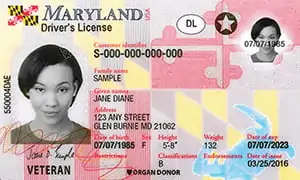Maryland
ID Scanning Laws
In Maryland, the law does not govern the act of businesses scanning IDs, but the retention of personal information derived from such scans is a matter of discretion for the business and can be subject to scrutiny.
- Maryland permits the use of ID scanners for verifying age and identity.
- The state has specific guidelines on the retention and use of information obtained from ID scans.
- Hotels and other establishments must ensure they adhere to these guidelines to avoid legal repercussions.
- The use of ID scanners is particularly encouraged for businesses selling alcohol to ensure compliance with age restrictions.




Maryland State Legislature
ID Scanning Resources
The Legal Framework
Maryland ID Scanning Laws and Regulations
The Legality of ID Scanning in Maryland
In Maryland, the use of ID scanners is legal and is especially encouraged for businesses that sell age-sensitive products. This includes hotels with bars or those that offer room service with alcoholic beverage options. The primary purpose of these scanners is to verify the age and identity of the individual, ensuring that they meet the legal age requirements for purchasing alcohol.
Data Retention and Privacy
While ID scanning is permitted, Maryland has specific guidelines on how the data obtained from these scans should be handled:
- Data Storage: Information obtained from an ID scan can be stored but must be kept secure to prevent unauthorized access.
- Data Usage: The data can only be used for the purpose it was collected, i.e., verifying age or identity. It cannot be sold or used for marketing purposes without explicit consent from the individual.
- Data Deletion: If there’s no legitimate reason to retain the data, it should be deleted within a reasonable timeframe.
Digital IDs in Maryland
With technological advancements, the use of digital IDs is becoming more common. Maryland is among the states that recognize and accept digital IDs. However, similar to physical IDs, businesses must ensure they handle digital ID data with the same level of care and adhere to the state’s guidelines on data retention and privacy.
Implications for Hotels
For hotels in Maryland, the implications are clear:
- Training: Staff should be adequately trained on how to use ID scanners and understand the importance of data privacy.
- Policy Implementation: Hotels should have clear policies in place regarding data retention and usage. This includes how long data is stored and who has access to it.
- Legal Compliance: Hotels must ensure they are in compliance with all state guidelines to avoid potential legal issues.
Defense for ID Scanning
Maine does not offer a general affirmative defense for ID scanning. However, there may be limited access to affirmative defense for tobacco sales. According to Maine Title 22, §1555-B, it is an affirmative defense to prosecution for a violation of retail sales of tobacco products if the defendant sold, furnished, gave away, or offered to sell, furnish, or give away a tobacco product in reasonable reliance upon a fraudulent proof of age presented by the purchaser.
Records of Purchases by Scrap Metal Processors
According to Maine Title 30-A, §3772, scrap metal processors are required to maintain records of each scrap metal purchase transaction. These records must include the name, address, and gender of the seller. The scrap metal processor is required to require the seller to provide proof of identification with a driver’s license, military identification card, passport, or other form of government-issued photo identification. The scrap metal processor must photocopy the form of photo identification presented and record the distinct identifying number of that photo identification.
Please note that this information is intended to provide a general overview and does not constitute legal advice. Always consult with a legal professional for advice specific to your situation
Maryland Anti-Trafficking Network
Our Fight Against Human Trafficking



Knowledge Base
Frequently Asked Questions
Yes, it's legal for hotels in Maryland to scan IDs, especially if they sell alcohol.
Hotels scan IDs primarily to verify the age and identity of guests, especially when selling age-sensitive products like alcohol.
While there's no fixed timeframe, Maryland guidelines suggest that data should be deleted within a reasonable period if there's no legitimate reason to retain it.
No, hotels cannot use the data for marketing or any other purpose other than what it was collected for without explicit consent from the individual.
Yes, Maryland recognizes and accepts digital IDs.
Hotels should train their staff, implement clear data policies, and regularly review these policies to ensure compliance with state guidelines.
